Graduate Students
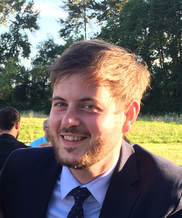
Dylan Antovich
I am a graduate student in Psychology, studying early language development. I am interested in the interactions between environment and cognition as infants learn the sounds and words used in their native languages. My current work examines how cognitive process, such as short-term memory, inhibitory control, and statistical learning influence infants' abilities to detect words in fluent speech and whether these processes differ based on language experience (e.g., monolingual vs. bilingual households).
I am a graduate student in Psychology, studying early language development. I am interested in the interactions between environment and cognition as infants learn the sounds and words used in their native languages. My current work examines how cognitive process, such as short-term memory, inhibitory control, and statistical learning influence infants' abilities to detect words in fluent speech and whether these processes differ based on language experience (e.g., monolingual vs. bilingual households).
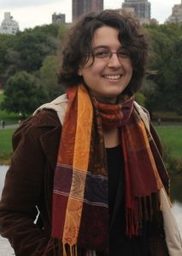
Eleonora Judith Beier
I was born in Italy, where I lived until 2012. In May 2016, I graduated from Bard College (NY) where I finished a BA in Psychology with a concentration in Mind, Brain and Behavior. My senior thesis explores strong emotional responses to music from familiar and unfamiliar cultures. Previously, I studied acoustic cues of incoming syntactic structure at Rutgers University, as part of an REU internship. Supported by a National Science Foundation Graduate Research Fellowship, I am now in my second year at UC Davis, pursuing a PhD with Dr. Ferreira. I plan to continue conducting research in Psycholinguistics and in music cognition at UC Davis.
I was born in Italy, where I lived until 2012. In May 2016, I graduated from Bard College (NY) where I finished a BA in Psychology with a concentration in Mind, Brain and Behavior. My senior thesis explores strong emotional responses to music from familiar and unfamiliar cultures. Previously, I studied acoustic cues of incoming syntactic structure at Rutgers University, as part of an REU internship. Supported by a National Science Foundation Graduate Research Fellowship, I am now in my second year at UC Davis, pursuing a PhD with Dr. Ferreira. I plan to continue conducting research in Psycholinguistics and in music cognition at UC Davis.
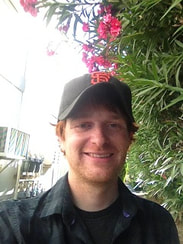
Adam Blalock
I am currently interested in researching how our experiences with the world influence how we process language. Specifically, can information we store in episodic memory be selectively recalled by the brain to understand the meaning of stories? Additionally, I would like to explore the possible relationship between semantic and episodic memory and the circumstances in which new semantic information is acquired by the brain episodically. I am also interested in applying my findings to help patients who suffer from deficits in memory and language, such as patients with Schizophrenia.
I am currently interested in researching how our experiences with the world influence how we process language. Specifically, can information we store in episodic memory be selectively recalled by the brain to understand the meaning of stories? Additionally, I would like to explore the possible relationship between semantic and episodic memory and the circumstances in which new semantic information is acquired by the brain episodically. I am also interested in applying my findings to help patients who suffer from deficits in memory and language, such as patients with Schizophrenia.
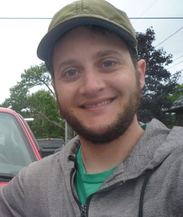
Shane Blau
Shane Blau is a PhD student in Linguistics, with an emphasis on neurolinguistics and sign languages. Previously, he completed a MA in linguistics at Gallaudet University. Currently, his research and training focuses on neural aspects of sign language processing, including plasticity and modality effects. He is primarily working on projects relating to children with cochlear implants, and the effects of early sign experience on language outcomes. In addition, he is being trained in ERP techniques and programming. Shane hopes to do his dissertation research on the linguistic and cognitive effects of delayed first language exposure in children with cochlear implants.
Shane Blau is a PhD student in Linguistics, with an emphasis on neurolinguistics and sign languages. Previously, he completed a MA in linguistics at Gallaudet University. Currently, his research and training focuses on neural aspects of sign language processing, including plasticity and modality effects. He is primarily working on projects relating to children with cochlear implants, and the effects of early sign experience on language outcomes. In addition, he is being trained in ERP techniques and programming. Shane hopes to do his dissertation research on the linguistic and cognitive effects of delayed first language exposure in children with cochlear implants.
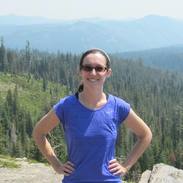
Kathryn Bousquet
I am a graduate student in the Psychology department and I am interested in sentence processing and memory. My research focuses on the various sources of information that are used to generate expectations about how a sentence will unfold. I examine how these expectations influence online sentence processing, as well as the construction of sentence representations in memory.
I am a graduate student in the Psychology department and I am interested in sentence processing and memory. My research focuses on the various sources of information that are used to generate expectations about how a sentence will unfold. I examine how these expectations influence online sentence processing, as well as the construction of sentence representations in memory.
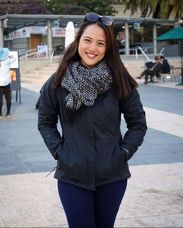
Nene (Suphasiree) Chantavarin
I am a graduate student in the Psychology PhD program, working with Dr. Fernanda Ferreira. Before coming to UC Davis, I received a BSc in Psychology from Chulalongkorn University, Thailand, and a BA in Psychology from the University of Queensland, Australia.
I’m interested in the cognitive and neural mechanisms underlying language comprehension and production. My current research project examines recurrent phrases (multi-word sequences) in reading comprehension using eye-tracking.
I am a graduate student in the Psychology PhD program, working with Dr. Fernanda Ferreira. Before coming to UC Davis, I received a BSc in Psychology from Chulalongkorn University, Thailand, and a BA in Psychology from the University of Queensland, Australia.
I’m interested in the cognitive and neural mechanisms underlying language comprehension and production. My current research project examines recurrent phrases (multi-word sequences) in reading comprehension using eye-tracking.
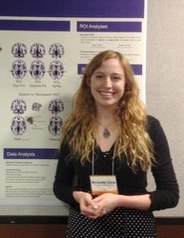
Michelle Cohn
Current Project:
Meta-analysis of language & music auditory processing: I'm currently exploring the relationship between musical training and auditory processing in a large-scale meta-analysis using Activation Likelihood Estimation (ALE) (Turkletaub et al., 2002). This method uses coordinates reported for particular contrasts (e.g., speech sounds vs. noise, sinusoidal tones, etc.) in published fMRI/PET studies to explore shared areas and networks of activation. I'm particularly interested in seeing whether connections / patterns of lateralization underlying language differ according to extent of musical training across studies.
Current Project:
Meta-analysis of language & music auditory processing: I'm currently exploring the relationship between musical training and auditory processing in a large-scale meta-analysis using Activation Likelihood Estimation (ALE) (Turkletaub et al., 2002). This method uses coordinates reported for particular contrasts (e.g., speech sounds vs. noise, sinusoidal tones, etc.) in published fMRI/PET studies to explore shared areas and networks of activation. I'm particularly interested in seeing whether connections / patterns of lateralization underlying language differ according to extent of musical training across studies.
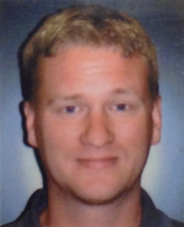
William Dyer
I'm interested in using computational methods to study the form of language, especially phonology, morphology, and syntax.
Current Projects:
Phonetic distance of cognate pairs -- Using data from reaction-time experiments of cognate-pair recognition to determine how to best quantify phonetic distance (e.g., simple edit distance, substitution-matrix, local/global alignment, k-mers)
Text Felicity -- Linguistically describing text felicity (the supra-grammatical features that indicate native-like or accomplished writing) and writing software to automatically detect infelicities
I'm interested in using computational methods to study the form of language, especially phonology, morphology, and syntax.
Current Projects:
Phonetic distance of cognate pairs -- Using data from reaction-time experiments of cognate-pair recognition to determine how to best quantify phonetic distance (e.g., simple edit distance, substitution-matrix, local/global alignment, k-mers)
Text Felicity -- Linguistically describing text felicity (the supra-grammatical features that indicate native-like or accomplished writing) and writing software to automatically detect infelicities
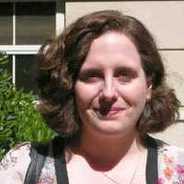
Erin Freed
Erin Freed’s word has focused on modeling individual differences in discourse comprehension.
Erin Freed’s word has focused on modeling individual differences in discourse comprehension.
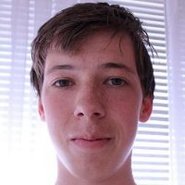
Vincent J. Hellendoorn
I study source code as primarily a means of communication: although one can write programs in myriad ways, programmers choose predictable expressions, using programming languages in ways similar to natural languages. This perspective turns out to be a powerful way to understand real-world coding, allowing me to use methods from computational linguistics, deep learning, data mining and traditional software engineering to understand how people write code and why they write it that way. Among others, I study norms of communications within projects (code and language), have helped build strong algorithms for code completion and defect detection, and have pushed the limits on understanding what part of code is repetitive (and in turn, what part is interesting) and why.
Webpage
I study source code as primarily a means of communication: although one can write programs in myriad ways, programmers choose predictable expressions, using programming languages in ways similar to natural languages. This perspective turns out to be a powerful way to understand real-world coding, allowing me to use methods from computational linguistics, deep learning, data mining and traditional software engineering to understand how people write code and why they write it that way. Among others, I study norms of communications within projects (code and language), have helped build strong algorithms for code completion and defect detection, and have pushed the limits on understanding what part of code is repetitive (and in turn, what part is interesting) and why.
Webpage
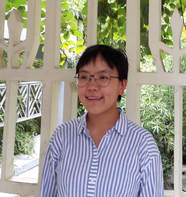
Zoey (Ying) Liu
I am a PhD student in Linguistics, working with Dr. Kenji Sagae. My research focuses on computational modeling of natural language structure and language typology. I employ corpus linguistics methods and natural language processing tools to further understanding of the underpinning of language universals and to design models that facilitate automatic processing of human language.
I am a PhD student in Linguistics, working with Dr. Kenji Sagae. My research focuses on computational modeling of natural language structure and language typology. I employ corpus linguistics methods and natural language processing tools to further understanding of the underpinning of language universals and to design models that facilitate automatic processing of human language.
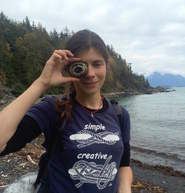
Tanya (Tatiana) Matyushkina
I am a first year PhD student in Perception, Cognition and Cognitive Neuroscience, working with Dr. Fernanda Ferreira. My academic interests lie in psycholinguistics, specifically, in questions of lexical disambiguation, sentence and discourse comprehension and underlying brain mechanisms. I have my Bachelor's degree in Applied Mathematics and Master's degree in Cognitive Studies, both from Saint Petersburg State University, Russia.
I am a first year PhD student in Perception, Cognition and Cognitive Neuroscience, working with Dr. Fernanda Ferreira. My academic interests lie in psycholinguistics, specifically, in questions of lexical disambiguation, sentence and discourse comprehension and underlying brain mechanisms. I have my Bachelor's degree in Applied Mathematics and Master's degree in Cognitive Studies, both from Saint Petersburg State University, Russia.
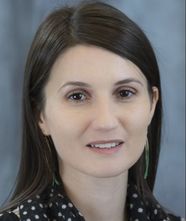
Milly (Ludmila) Midrigan
My name is Milly. I am a second year grad student in Dr. Corina's Lab. I am interested in Multilingualism and Language Processing in Multilingual populations. I am planning to be primarily using EEG, fMRI and behavioral methods to ask questions in my studies.
My name is Milly. I am a second year grad student in Dr. Corina's Lab. I am interested in Multilingualism and Language Processing in Multilingual populations. I am planning to be primarily using EEG, fMRI and behavioral methods to ask questions in my studies.

Harvey (Zhuang) Qiu
I am a graduate student in the Linguistics PhD. program, working with Professor Ferreira since 2017. I am interested in how functional pressure influences the selection of syntactic structures during language production, and how people communicate with superficial interpretation of linguistic input.
I am a graduate student in the Linguistics PhD. program, working with Professor Ferreira since 2017. I am interested in how functional pressure influences the selection of syntactic structures during language production, and how people communicate with superficial interpretation of linguistic input.
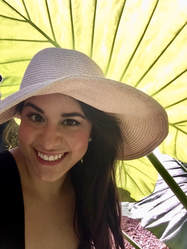
Erica Verde
I am a second year doctoral student in the psychology department working with Dr. Katharine Graf Estes. I am broadly interested in lexical acquisition and processing in both monolingual and bilingual populations. In particular, I'm interested in how variability in the input affects infants' ability to recognize meaningful language features. A simultaneous English-Spanish bilingual originally from Miami, I hold a bachelor's degree in Psychology from the University of Miami and a master's degree in Linguistics from Florida International University. Before joining the Language Learning Lab, I managed an infant language lab at Stanford University under Dr. Anne Fernald, as well as the ISI bilingual language processing lab under Dr. Giuli Dussias at the Pennsylvania State University.
I am a second year doctoral student in the psychology department working with Dr. Katharine Graf Estes. I am broadly interested in lexical acquisition and processing in both monolingual and bilingual populations. In particular, I'm interested in how variability in the input affects infants' ability to recognize meaningful language features. A simultaneous English-Spanish bilingual originally from Miami, I hold a bachelor's degree in Psychology from the University of Miami and a master's degree in Linguistics from Florida International University. Before joining the Language Learning Lab, I managed an infant language lab at Stanford University under Dr. Anne Fernald, as well as the ISI bilingual language processing lab under Dr. Giuli Dussias at the Pennsylvania State University.
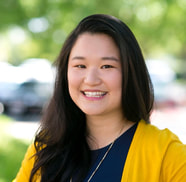
Zoe Yang
I am a second year PhD student, working with John Henderson and Fernanda Ferreira. I have a masters degree in Mind, Brain, and Education from Harvard and I’m an alumna of Mount Holyoke College.
I am a second year PhD student, working with John Henderson and Fernanda Ferreira. I have a masters degree in Mind, Brain, and Education from Harvard and I’m an alumna of Mount Holyoke College.